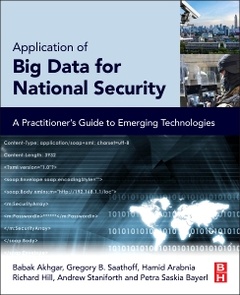Description
Application of Big Data for National Security
A Practitioner’s Guide to Emerging Technologies
Authors: Akhgar Babak, Saathoff Gregory B., Arabnia Hamid R, Hill Richard, Staniforth Andrew, Bayerl Petra Saskia
Language: English
Subjects for Application of Big Data for National Security:
69.52 €
In Print (Delivery period: 14 days).
Add to cartSupport: Print on demand
Description
/li>Contents
/li>Biography
/li>Comment
/li>
Application of Big Data for National Security provides users with state-of-the-art concepts, methods, and technologies for Big Data analytics in the fight against terrorism and crime, including a wide range of case studies and application scenarios. This book combines expertise from an international team of experts in law enforcement, national security, and law, as well as computer sciences, criminology, linguistics, and psychology, creating a unique cross-disciplinary collection of knowledge and insights into this increasingly global issue.
The strategic frameworks and critical factors presented in Application of Big Data for National Security consider technical, legal, ethical, and societal impacts, but also practical considerations of Big Data system design and deployment, illustrating how data and security concerns intersect. In identifying current and future technical and operational challenges it supports law enforcement and government agencies in their operational, tactical and strategic decisions when employing Big Data for national security
Section 1: Introduction to Big DataChapter 1 – An Introduction to Big DataChapter 2 – Drilling into the Big Data Goldmine: Data Fusion and High Performance Analytics for Intelligence Professionals
Section 2: Core Concepts and Application ScenariosChapter 3 – Harnessing the Power of Big Data to Counter International TerrorismChapter 4 – Big Data and Law Enforcement: Advances, Implications, and Lessons from an Active Shooter Case StudyChapter 5 – Interpretation and Insider Threat: Re-Reading the Anthrax Mailings of 2001 Through a "Big Data" LensChapter 6 – Critical Infrastructure Protection by Harnessing Big DataChapter 7 – Military and Big Data RevolutionChapter 8 – Cyber-Crime, Attack-Motivations and Implications for Big Data and National Security
Section 3: Mathods and Technological SolutionsChapter 9 – Requirements and Challenges for Big Data ArchitectureChapter 10 – Tools and Technologies for the Implementation of Big DataChapter 11 – Mining Social Media: Architecture, Tools, and Approaches to Detect Criminal ActivityChapter 12 – Making Sense of Unstructured Natural Language InformationChapter 13 – Literature Mining and Ontology Mapping Applied to Big DataChapter 14 – Big Data Concerns in Autonomous AI Systems
Section 4: Legal and Social ChallengesChapter 15 – The Legal Challenges of Big Data Applications in Law EnforcementChapter 16 – Big Data and the Italian Legal FrameworkChapter 17 – Accounting for Cultural Influences in Big Data AnalyticsChapter 18 – Making Sense of the Noise: An ABC Approach to Big Data and Security
Hamid R. Arabnia is currently a Full Professor of Computer Science at University of Georgia where he has been since October 1987. His research interests include Parallel and distributed processing techniques and algorithms, interconnection networks, and applications in Computational Science and Computational Intelligence (in particular, in image processing, medical imaging, bioinformatics, and other computational intensive problems). Dr. Arabnia is Editor-in-Chief of The Journal of is Associat
- Contextualizes the Big Data concept and how it relates to national security and crime detection and prevention
- Presents strategic approaches for the design, adoption, and deployment of Big Data technologies in preventing terrorism and reducing crime
- Includes a series of case studies and scenarios to demonstrate the application of Big Data in a national security context
- Indicates future directions for Big Data as an enabler of advanced crime prevention and detection
These books may interest you

Emerging Trends in ICT Security 110.33 €



